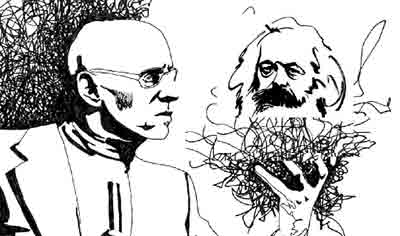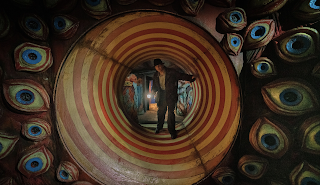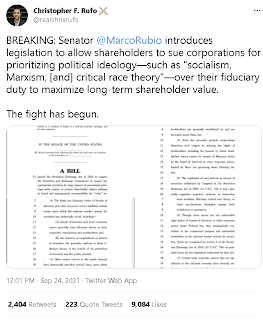Tuesday, May 10, 2022
Boys Becoming Men, Men Becoming Wolves: on The Wolf of Snow Hollow and Werewolves Within
Sunday, May 01, 2022
Elites and Capital: or, Foucault and Marx Again
Thursday, April 21, 2022
If Althusser was a Spinozist...: on Juan Domingo Sánchez Estop's Althusser et Spinoza
One of Althusser's fundamental lessons, and one that remains beyond the controversies about epistemic breaks, the young Marx, and the real Marx, is that Marx's philosophy and politics must be located not at this or that isolated quote or passage, but as traversing the entirety of his work. The condition of immanent causality is a reading of philosophy itself as the immanent unfolding of ideas that are all the more important because they are pervasive, located not in this or that passage, but in the entirety of the work. To some extent Juan Domingo Sánchez Estop's Althusser et Spinoza: Détours et Retours does a similar work on Althusser, searching for Althusser's Spinozism not just in the few well known passages in the ISA essay, Lire Le Capital, and Elements of Self-Criticism where Spinoza is cited by name, but also in the way that Spinoza's thought or practice of philosophy traverses Althusser's work.
Tuesday, April 19, 2022
Gonna Leave You All Severed: Initial Reflections on Severance
I was slow to get to Severance. Partly this has to do with conditions of contemporary cultural consumption. The shift from movies to television and from television to streaming, accelerated by the pandemic, has raised particular hurdles to watching new television shows even as everything can be viewed from one's home. Every new show comes with the subscription to a new service (or a way to work around it) and the proliferation of these services with their own branding and marketing enough to make me miss the catholic nature of movie theaters. Of the different services I had particular disdain for Apple TV, mostly due to the cross brand marketing and the lingering aftertaste of itunes as an app. Anything that could immediately disseminate a U2 album should not only be shunned but the people who made it should be banished.
Wednesday, March 30, 2022
Operation Blue Thunder: Or, First time as Violence, Second time as Action
Recently in a bit of odd exhaustion and insomnia I watched, or rather rewatched, the movie Blue Thunder. In case you have not seen it I will tell you the plot. It stars Roy Scheider as a LAPD helicopter pilot and Vietnam vet. He is introduced to a helicopter with the code named "Blue Thunder" which is part of an increased security preparations for the 1984 Olympics. The helicopter is an armored attack and surveillance helicopter complete with a machine gun, powerful directional microphones, and infrared cameras. Over the course of the movie, and I am hazy on the details or may have fallen asleep, Scheider comes to the realization the helicopter is not only an unacceptable militarization of the police but would function as the basis of an intolerable expansion of powers of the state's powers of surveillance. After the requisite helicopter dog fights and car chases he parks the helicopter in front of a freight train and destroys it.
Thursday, March 24, 2022
Two Great Tastes Part Two: The Introduction to Fischbach's La Production des Hommes
Sunday, March 06, 2022
Imagination, Fiction, Knowledge: Towards a Spinozist Theory of Cultural Production Part II (This Time it is Mythical)
Tuesday, February 22, 2022
Any Bird Whatsoever: on Fujita's Le Ciné-Capital: D'Hitchcock à Ozu
Thursday, February 03, 2022
Are Geeks Born or Made: On Nightmare Alley (movies and the book)
Saturday, January 22, 2022
Looking Back in the Mirror of Production: An Introduction to an Unwritten Book on Deleuze and Guattari and Marx
Saturday, January 15, 2022
Despair and Indignation: The Inevitable Reflection on Covid (with Marx and Spinoza)
Monday, December 27, 2021
Get Meta With Me: On Matrix Resurrections
The Matrix is a film about work. Long before Neo escapes the matrix he has to break out of a much more mundane space of confinement, the office cubicle. The film is thus part of that odd series of films that came out in 1999 that were about the confines of the cubicle and the working day, a list that includes Office Space, Fight Club, and American Beauty (and Being John Malkovich). It was an odd year, in the midst of the dot-com bubble and the Clinton third way, a year that on the surface was good for capitalism, the movies were telling a different story, a story in which work and the office was sucking the life out of people. An idea which The Matrix made literal in its dystopian future of energy sucking pods, in other words, cubicles 2199.
Saturday, December 18, 2021
Red Spinozism II: Lordon Vs. Fischbach
Sunday, December 05, 2021
Homework: Three Recent Books on Work
Thursday, November 18, 2021
Shine On: We Are All in Room 237 Now
Of all of the various concepts and neologisms that populate A Thousand Plateaus that of the "regime of signs" is one that never really caught on. It has not had the same effects as nomadology, rhizome, virtual, assemblage, body without organs, become etc., If I had to offer a quick explanation of this it is perhaps because the idea of the sign, and of a regime of signs, still seems like a remnant of an earlier period, more structuralist than post-structuralist. It is for that reason that it has remained something of a B-side or a deep cut, taking a clue from Deleuze and Guattari's assertion that the book is more like album with different plateau songs than a linear progression.
Friday, November 12, 2021
Other Scenes: Balibar and Tosel on Class Struggle and the Struggle over Identity
Wednesday, October 13, 2021
The Dialectic of Conspiracy and Trust: Hegel and Conspiracy Theories
This post is an immediate follow up or even sequel to an earlier post on Spinoza and conspiracy theories. In a more oblique way it is also a follow up to something that I have said repeatedly on this blog, that not only is there more to Hegel's Phenomenology of Spirit than the master and slave, but that other dialectical scenes or figures can also be wrested from the linear progression of Hegel's thought to become the basis of social and political criticism. Kojeve can't have all of the fun.
Friday, October 01, 2021
Coming Soon (well soonish): The Double Shift
Sunday, September 19, 2021
Reworking Hegel: Philosophies of Work in Macherey's Petit Riens
There is a line that I used to attribute to Roland Barthes, "those who do not reread are doomed to read the same book over and over again." I liked the riddle like nature of the phrase, and the way it seemed to posit a first read which is often a restating of one's already existence preconceptions, hence the rereading of the same book under different covers, against a rereading that discovers difference in repetition.
Wednesday, August 25, 2021
Fighting for Subjection as if it was Rebellion: Spinoza and Servitude Today
As I have already indicated on this blog more than once, Spinoza's formulation of subjection remains in some sense a guiding question for me.
"...the supreme mystery of despotism, its prop and stay, is to keep men in a state of deception, and with the specious title of religion to cloak the fear with which they must be held in check, so that they will fight for their servitude as if for salvation, and count it no shame but the highest honour, to spend their blood and lives for the glorification of one man…" --Spinoza, Tractatus Theologico-Politicus 1670
So much so that I would be willing to agree with Gilles Deleuze and Félix Guattari when they repeated it three hundred years later.
"That is why the fundamental problem of political philosophy is still precisely the one that Spinoza saw so clearly, and that Wilhelm Reich rediscovered: “Why do men fight for their servitude as stubbornly as though it were their salvation?” --Gilles Deleuze and Félix Guattari, Anti-Oedipus: Capitalism and Schizophrenia 1972
However, I have begun to think that it is time to update the question, or at least change its formulation, it increasingly seems to me that in the current era it is not so much servitude that is fought for as salvation, but subjection that is fought for as rebellion, or misrecognized as rebellion.
Saturday, July 31, 2021
The Use and Abuse of Alienation for Life: A few Remarks on Marx
Monday, July 19, 2021
What Does it Mean to be a Materialist: Thoughts After Spinoza after Marx
Of all of the zoom events, conferences, and presentations that I have attended (zoomed?) this year the one dedicated to Spinoza after Marx was the most engaging, the one most capable of breaking through the zoom screen that makes everything feel further away even as it is so close, inches away even. This is in part because of the participants, but it was also due to the work of the organizers who, in an interesting variation on organizing around a common theme, presented a common set of theses that were discussed and debated over the course of the three days. Of course as great as this was as an online event it is hard not to think about how those conversations would have continued over dinner, at bars, and coffee shops. The event did create a collective act of thought, of thinking in common, but as Spinoza and Marx both know there is no thinking together, thinking in common, without acting and feeling in common.
Saturday, July 03, 2021
Self-Interest is the Sincerest Form of Flattery: On No Sudden Move
After a mercurial career Steven Soderbergh seems to have more or less settled into the heist film. The three Oceans films, Logan Lucky (dubbed Oceans 7-11 for the way it transposed those films into a different class milieu), and now No Sudden Move. The return to the same genre does not dispense with the shifts and shimmers through other genres and styles, the latest is a noir period piece set in fifties Detroit, and with that shift comes another shift. Jameson states that heist films are in some sense about the representation of work. Or, more to the point, he states that they are about unalienated work. However, I would like to turn his assertion, as offhand as it is, into a question. How does the heist film represent work, and how does this representation relate to the question of how work is undertaken and understood in capitalism.
Saturday, June 19, 2021
Theological Breaks: Tosel on Marx's Critique of Religion
Tuesday, June 01, 2021
Anti-Hobbes: Waging War on the War of All Against All
Wednesday, May 05, 2021
Put Your Halo On: Marx’s Critiques of Moralism
Saturday, April 24, 2021
Woke Capital and Twilight of the Bourgeoisie (How is that for a title?).
Thursday, April 08, 2021
Go Figure: On Lordon's Figures du Communisme
Wednesday, March 31, 2021
How the World of Fiction Became True: On The Department of Truth
Thursday, March 11, 2021
Althusser Effects: Philosophical Practices
One of the most damming things anyone has ever said to me, at least about academic philosophy was something like the following, "philosophy at universities today is to doing philosophy what art history is to making art." The implication being that emphasis in the modern university is on following different philosophers; tracing their influences and transformations the way that a historian my trace the different periods of an artist. It seemed damming, but not inaccurate, especially with respect to the way that there seems to be a trajectory, at least in continental programs of setting oneself up as [blank] guy, following a philosopher, interpreting, commenting and translating. There are a lot of questions that can be posed about this model, especially now, as philosophy continues to be pushed outside of the university, and forced to reinvent itself in new spaces and publications.
Thursday, March 04, 2021
Everyone is Disposable: On Ogilvie's L' Homme Jetable
Wednesday, February 24, 2021
Reduction to Ignorance: Spinoza in the Age of Conspiracy Theories
I was obsessed with conspiracy theories at some point in my adolescence. I listened to late night radio shows dedicated to alien abductions, satan messages on records, and a more local phenomena known as the mellonheads. These were jokes to me, or at least half jokes, I never took any of them seriously. However, they did contribute to growing sense that there was more to the world than what I was told. Adolescence and conspiracy theories go well together. In recent years, however, it increasingly seems like conspiracy theories have moved from the periphery to the mainstream, and from entertainment to politics. It is hard to avoid the fact that we are living through a profound transformation of knowledge, authority, and politics, and a revival of mystical and mythic forms of knowledge that go beyond any dialectic of enlightenment. It may then turn out that the old arguments regarding superstition have taken on a new relevance. As is often the case on this blog, I am starting here with Spinoza, I have a plan to continue this with a post on Hegel and then Marx, (we will see how it goes).
Monday, February 15, 2021
What's Love Got to Do With It? On Sarah Jaffe's Work Won't Love You Back
For the past ten years I have been teaching a class called The Politics and Philosophy of Work. At least once a semester someone mentions the phrase, or mantra, "Do what you love and you'll never have to work a day in your life." This bit of wisdom, which has been attributed to various different sources, is offered as the solution to all of the problems of work and of life. Like similar phrases of popular philosophy imploring us to live in the moment, or live each day like it is our last, its popularity is directly proportional to its disconnect with anything resembling reality.
Saturday, January 30, 2021
Ghosting: The Long Life of Red Scares
This post could be considered a follow up to my previous post on The Communist Manifesto. In each case it is a matter of what could be considered an error of the Manifesto. I know that it seems wrong to pick on the Manifesto a text which is less an attempt to state everything than an intervention in a specific theoretical and political conjunction--a stunning one. My one real criticism of the Manifesto is that its length has led to be being seen as THE summation of Marx's position so that even Jordan Peterson can read it before debating Zizek. However, it is a useful text to confront some of the limitations of Marxist thought. As I argued in the previous post, the assertion of the ruthlessly modernizing of the bourgeois mode of production makes it difficult to grasp the way in which not all that is solid melts into air, some of keeps coming back.
Friday, January 01, 2021
Everybody is a Troll to Somebody: On Chris Beckett's Two Tribes (partially)
More than once I have made the joke that if philosophy really wanted to go back to its Platonic (or Socratic roots) then it most recognizing trolling as the new sophists. Trolling seems to be a more relevant form of "anti-philosophy," to use Badiou's term, than Wittgenstein or Nietzsche if only because the former is more prevalent, shaping the arguments that make up what passes for the public sphere, and not just a few philosophy classrooms.
Sunday, December 20, 2020
...as if it was Salvation: Dialectics of Obedience in Spinoza
Dimitris Vardoulakis' Spinoza, the Epicurean: Authority and Utility in Materialism puts forward the bold thesis that there is a dialectic of authority and utility in Spinoza. That obedience is situated between authority, between the "Potestas" of kings and God, and utility, the potentia of intellect and bodies. It is from this perspective that Vardoulakis presents a reading of Spinoza's Tractatus Theologico-Politicus. Despite the title of the book, which suggests a more modest exegetical undertaking, the stakes of this are less a matter of simply tracing the epicurean dimensions of Spinoza's thought (although it does that) than using those threads to expand the stakes of Spinoza's political thought. Vardoulakis' book takes on not only other readers of Spinoza, Negri, Deleuze, Althusser, Balibar, and Sharp, but also the central question of Spinoza's thought, why do people fight for their servitude as if it was salvation?
Monday, December 14, 2020
Waiting for the Robots: Benanav and Smith on the Illusions of Automation and Realities of Exploitation
Thursday, November 26, 2020
Pop Culture Prophecy: Empire's Decline from Fantasy to Reality
During the odd grifter's interregnum of the last few weeks a particular image came to mind. The image, reproduced above, depicts the President of a dystopian American turning into a monster and clinging to power. I am not sure how it was jogged from my memory, but it seemed to fit the last few weeks since the election. It is from the comic book Scout written and drawn by Tim Truman and published by Eclipse Comics from 1985-1987. It was one of my favorite comics growing up even though judging by its status today, and conversations with other comics fans, it has been overlooked or forgotten. I haven't been able to forget it, and in many ways it seems to be a better guide to our present than the superheroes from the same era who have only become more central to popular culture.
Friday, November 13, 2020
Solidarities: Negative, Symbolic, and Actual
As I write this the COVID-19 pandemic is returning to rates of infection and death in the US that exceed even the peak of last spring. The only difference is that, with a few exceptions, there are no new lockdowns. Schools are, partially in session, restaurants are open, and it might even be possible to go see a movie. The gap between the current crisis and the response is so wide that it has all of the feel of some kind of science fiction dystopia, noticing it feels like you are wearing the special glasses. I am sometimes find myself wanting to run through the streets screaming COVID-19 is still happening!
Friday, October 30, 2020
What Do Werewolves Dream of? On An American Werewolf in London
Of the three werewolf films that were released in 1981 An American Werewolf in London is that one that I have the strongest memory of even though it has had the least impact on me in the years that followed. Wolfen is a cult classic, and I am definitely in the cult, The Howling is a solid film, but An American Werewolf in London scared the hell out of me as a kid. This was in part because I saw it at far too young of an age. I do not know what my parents were thinking when they took me to it at ten, perhaps that it would be more comedy than horror, which makes sense given Blues Brothers and Animal House. All I really remember was asking to leave the theater after first werewolf attack scene on the moors, my parents tried to get me to stay, knowing that I loved monsters, but by the time Jack showed up as an ambulatory corpse I was done. We left the theater.
Monday, October 12, 2020
Man is a Super-Villain to Man: The Boys and the limits of Satire
Horkheimer and Adorno had to invent the neologism the "culture industry" to criticize the subordination of culture to commerce, these days we can accomplish the same thing by just saying "comic book movies." Comic book movies, or, to be more specific "Marvel movies" has become a shorthand for getting at the intersection of branding, commerce, and culture. I would argue that this particular shorthand leaves too many terrible, cynical, and derivative products off of the hook, like the execrable Rise of the Skywalker and the latest sequels to Jurassic Park and Terminator, but that is not the point here. My point is the way that the Amazon series The Boys takes this idea of the superhero as a figure of cultural and commercial dominance and doubles down on it.
Saturday, October 10, 2020
Ideological Tendencies: Machiavelli, Spinoza, Marx
Wednesday, September 16, 2020
God's Fortune: Reading Machiavelli in Spinoza
Tuesday, September 08, 2020
Another Dialectic of the Other Scene: This Time It is Tosel
Friday, August 14, 2020
Seeing the Better and Doing the Worse: The Assistant and Work
Friday, August 07, 2020
The Interruption of Individuation: Some Tertiary Retentions in Memory of Bernard Stiegler
Friday, July 31, 2020
The Use and Abuse of Blockbusters for Life: Movies and Memes in the Age of Viral Collapse


















































